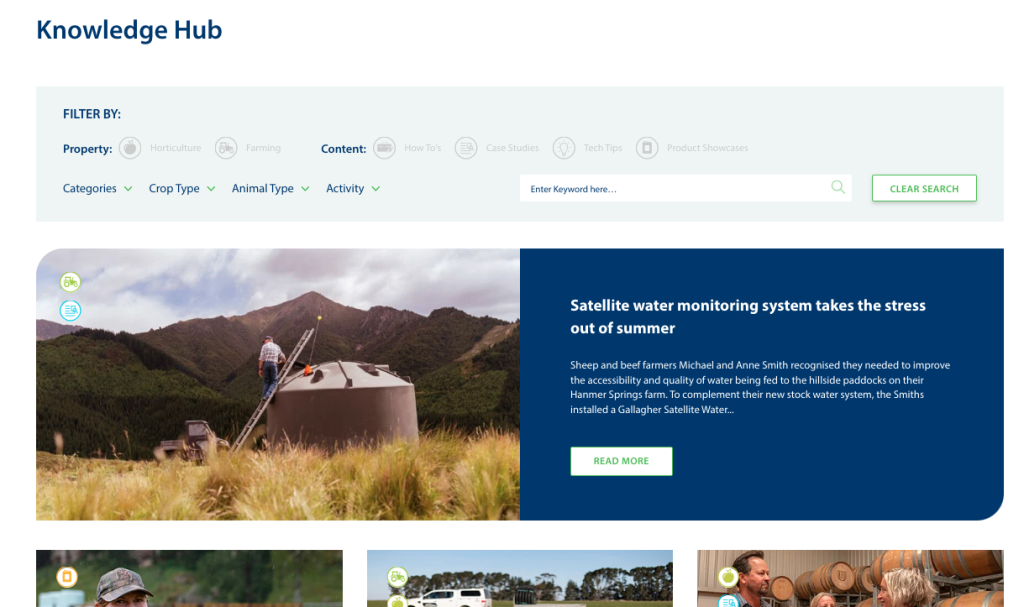The biggest staple in sustainable business is lead generation, and as competition intensifies and users become more savvy, it’s more crucial than ever. It may be time for you to consider a change in your lead gen strategy to get better results.
In this article, we explore five lead gen methods we often discuss with our clients including content marketing, SEO, email marketing, social media and using AI and predictive metrics. We hope it’ll give you some ideas of new things to action in your own efforts to boost your B2B website’s lead generation.

Content marketing: educate to engage
In not so many words, content marketing is the effort to attract people to your business by producing content that brings value to your audience. Specifically, it’s relevant, engaging and informative content that answers questions or solves problems your audience has.
A lot of B2B ecommerce websites do the same thing when they tack a blog on the end of their navigation menu; they do brief write-ups on their products and the occasional industry news. To get the most out of your content, go beyond showcasing products. Explore trends in your industry, tips, behind-the-scenes glimpses and your own insights. By offering valuable content, you not only educate your audience but also position your brand as a trusted authority.
Let’s say you sell industrial cleaning products and machinery to businesses. You could:
- create a series of blog posts targeting pre-purchase decisions, like “Five things to consider before buying a floor buffer”
- make infographics comparing different products
- shoot videos demonstrating popular products and different applications
- write an article on “The top 10 trends in large building cleaning and maintenance”
These pieces of content become resources that not only establish your brand as an authority but also help in capturing leads looking for solutions you offer.
Case study: PGG Wrightson

Agribusiness giant, PGG Wrightson launched a knowledge hub on their ecommerce store to solidify their position in the market as experts in agriculture and farming.
They have created hundreds of articles on various topics from animal management, to pest control, to fencing. Each of these articles ranks for keyword searches, increasing their chance of discovery with every post published.
PGG Wrightson also apply cross-linking on their site by featuring relevant article links on product pages and vice versa,

Email marketing: personalise to connect
Email marketing remains one of the most effective channels for direct communication with your customers and potential leads. The focus with email is on personalisation and again, providing value to the recipient in every email sent.
Email marketing is all about building personal connections based on the information you have about their audience. For instance, an online bookstore may segment their subscribers based on their reading preferences. Then they could tailor emails to recommend books or provide content like author interviews or reviews that are relevant to them. That personalised approach makes subscribers feel valued, fostering loyalty and increasing the likelihood of conversion.
In a lead generation example, after a visitor downloads a piece of content or whitepaper from your site, enroll them in an email flow campaign that provides additional related resources and eventually guides them towards a meeting, demo or purchase. Touches like personalisation tokens (like the recipient’s name or company) and tailored content can significantly increase engagement rates.

SEO: optimise to be found
Search engine optimisation (SEO) helps your website appear at the top of search engine results for relevant queries. In other words, critical to your website’s visibility. This method involves optimising your website’s content, structure, and on-page elements like meta tags and descriptions, along with building quality backlinks.
You would start by conducting keyword research to find terms your potential clients are searching for, and tailor your website’s content for these keywords. So if “wholesale electronic components” is a key search term for your target audience, you may create detailed product pages, blog posts, and guides that focus on this keyword, ensuring your site ranks higher in search results.

Social media: engage to build a community
Social media platforms offer a unique opportunity to build relationships with customers and potential leads alike by engaging with them where they spend a considerable amount of time. The key here is knowing which platform(s) your audience is on. You may use LinkedIn to share industry insights, company news, and valuable content from your website. You also may use Instagram or TikTok to showcase your business/culture to a younger demographic.
Engagement begets engagement. Join industry-specific groups or watch interest groups and participate in discussions to increase your visibility. It’s the regular engagement with your audience through comments and messages that will turn followers into leads.

AI & predictive metrics: predict to prioritise
Predictive analytics is way of examining past and current data to answer the question, ‘what might happen in the future?’ Leveraging AI and predictive analytics can transform how you identify and engage with potential leads by predicting which prospects are most likely to convert.
Using one of many available tools and platforms, you could implement a predictive scoring system that uses AI to analyse your website visitors’ behaviour, historical data, and engagement patterns to score leads based on their likelihood to purchase. This allows you to prioritise and personalise your outreach to the leads with then highest potential, increasing your conversion rates.
Suppose you owned an electronics online store. You could use AI to analyse customer preferences and use predictive metrics to anticipate trends. So then if AI indicates a rising interest in, say, fitness wearables, you could launch a targeted marketing campaign around smart fitness trackers. This data-driven approach ensures you stay ahead of the curve.
Getting intentional with lead generation
Generating leads for your B2B ecommerce website requires a multifaceted approach. By employing the strategies above and continuously optimising based on performance data, you can increase your website’s lead generation effectiveness and drive sustainable growth for your business.
Remember, the key to success is providing value, engaging with your audience, and leveraging technology to streamline and enhance your marketing efforts.
BY CRAIG RUNDLE
Director at Tin Soldier
Craig, Founder and Director at Tin Soldier lives and breathes digital. Being slightly geeky, since the late 90’s he has been involved and watched the internet grow from one page websites through Web 2.0 and more recently with the advent of AI technologies. Craig’s passion is ecommerce, in particular creating great customer experiences through personalisation, content and connected systems.
